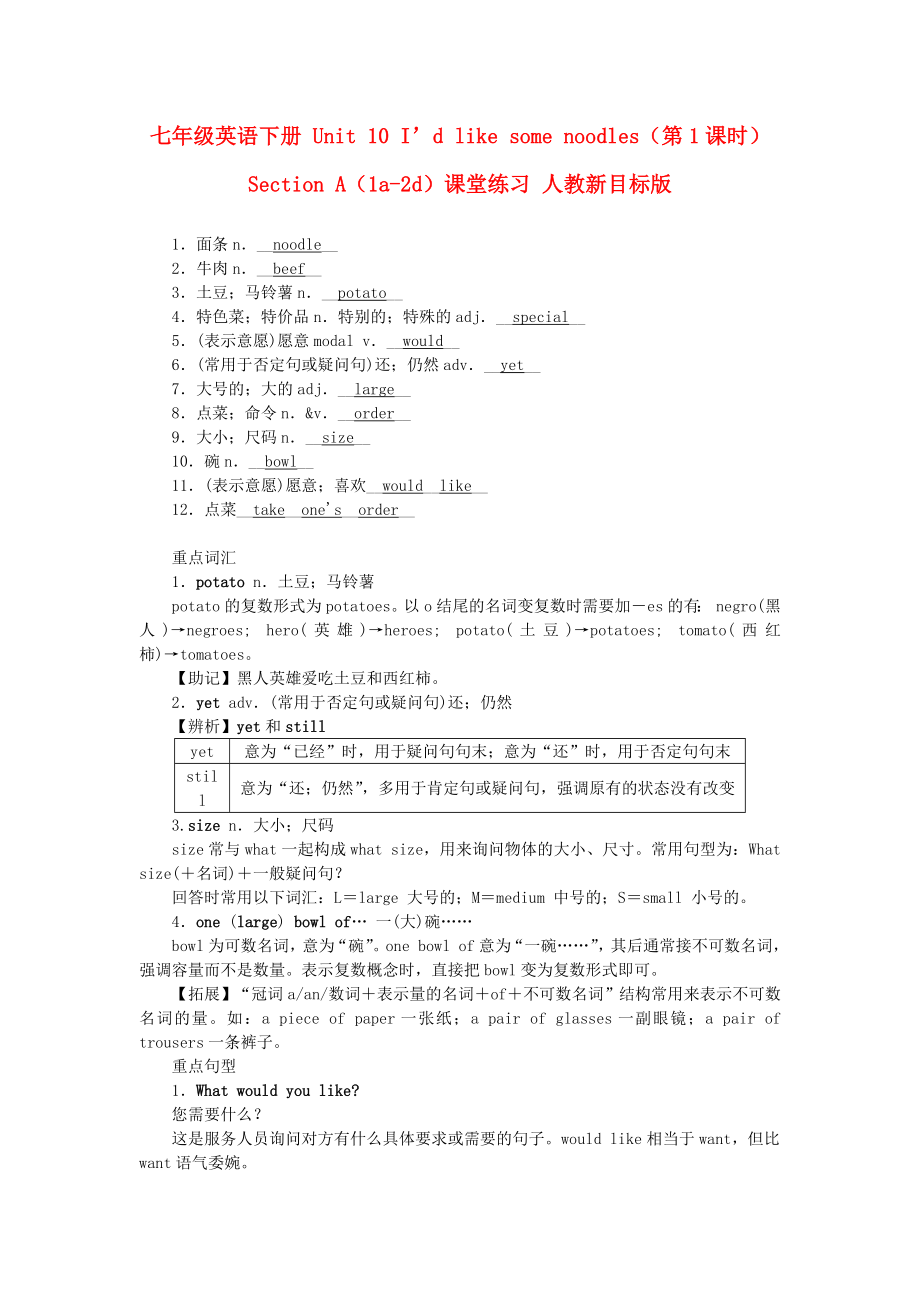《七年級(jí)英語下冊 Unit 10 I’d like some noodles(第1課時(shí))Section A(1a-2d)課堂練習(xí) 人教新目標(biāo)版》由會(huì)員分享�,可在線閱讀,更多相關(guān)《七年級(jí)英語下冊 Unit 10 I’d like some noodles(第1課時(shí))Section A(1a-2d)課堂練習(xí) 人教新目標(biāo)版(4頁珍藏版)》請(qǐng)?jiān)谘b配圖網(wǎng)上搜索��。
1��、七年級(jí)英語下冊 Unit 10 I’d like some noodles(第1課時(shí))Section A(1a-2d)課堂練習(xí) 人教新目標(biāo)版
1.面條n.__noodle__
2.牛肉n.__beef__
3.土豆���;馬鈴薯n.__potato__
4.特色菜;特價(jià)品n.特別的��;特殊的adj.__special__
5.(表示意愿)愿意modal v.__would__
6.(常用于否定句或疑問句)還��;仍然adv.__yet__
7.大號(hào)的����;大的adj.__large__
8.點(diǎn)菜;命令n.&v.__order__
9.大?���。怀叽an.__size__
10.碗n.__bo
2�、wl__
11.(表示意愿)愿意�����;喜歡__would__like__
12.點(diǎn)菜__take__one's__order__
重點(diǎn)詞匯
1.potato n.土豆���;馬鈴薯
potato的復(fù)數(shù)形式為potatoes。以o結(jié)尾的名詞變復(fù)數(shù)時(shí)需要加-es的有: negro(黑人)→negroes; hero(英雄)→heroes; potato(土豆)→potatoes; tomato(西紅柿)→tomatoes����。
【助記】黑人英雄愛吃土豆和西紅柿。
2.yet adv.(常用于否定句或疑問句)還�;仍然
【辨析】yet和still
yet
意為“已經(jīng)”時(shí),用于疑問句句末�;意為
3、“還”時(shí)�����,用于否定句句末
still
意為“還�����;仍然”�,多用于肯定句或疑問句,強(qiáng)調(diào)原有的狀態(tài)沒有改變
3.size n.大小����;尺碼
size常與what一起構(gòu)成what size,用來詢問物體的大小�����、尺寸�����。常用句型為:What size(+名詞)+一般疑問句�?
回答時(shí)常用以下詞匯:L=large 大號(hào)的;M=medium 中號(hào)的���;S=small 小號(hào)的。
4.one (large) bowl of… 一(大)碗……
bowl為可數(shù)名詞��,意為“碗”�。one bowl of意為“一碗……”,其后通常接不可數(shù)名詞���,強(qiáng)調(diào)容量而不是數(shù)量�����。表示復(fù)數(shù)概念時(shí)�����,直接把bowl變?yōu)閺?fù)數(shù)形式即可��。
4��、【拓展】“冠詞a/an/數(shù)詞+表示量的名詞+of+不可數(shù)名詞”結(jié)構(gòu)常用來表示不可數(shù)名詞的量�。如:a piece of paper一張紙;a pair of glasses一副眼鏡�����;a pair of trousers一條褲子�。
重點(diǎn)句型
1.What would you like?
您需要什么?
這是服務(wù)人員詢問對(duì)方有什么具體要求或需要的句子�����。would like相當(dāng)于want���,但比want語氣委婉�����。
2.—What kind of noodles would you like?
—I'd like beef noodles, please.
——你想要哪種面條���?
——我想要牛
5��、肉面����。
(1)在口語中��,當(dāng)詢問某人想要哪種類型的東西時(shí)��,用What kind of…would you like?
(2)beef noodles牛肉面��。相當(dāng)于noodles with beef���。句中的beef 作noodles的定語����。當(dāng)一個(gè)名詞在另一個(gè)名詞前充當(dāng)定語��,即當(dāng)名詞修飾名詞時(shí)��,起修飾作用的名詞一般用其單數(shù)形式���。如:two apple trees 兩棵蘋果樹�。
【拓展】 ①當(dāng)man 和woman作定語修飾另一個(gè)名詞時(shí)���,要與所修飾的名詞的單復(fù)數(shù)保持一致�����。如: two men workers 兩名男工人�����; a man doctor 一名男醫(yī)生����。
②sport常用復(fù)數(shù)形式作定語����。如
6、:sports shoes運(yùn)動(dòng)鞋���;sports meeting運(yùn)動(dòng)會(huì)�����。
3.May I take your order?
你們可以點(diǎn)餐了嗎�����?
這是點(diǎn)餐常用語����。用于服務(wù)員咨詢客人是否可以點(diǎn)餐了。類似的還有: Can I help you�?/What can I do for you?回答時(shí)一般先說“Yes, please.”���,然后再說“I'd like…”說明點(diǎn)什么餐����。
Ⅰ.根據(jù)句意及漢語提示完成句子���。
1.—May I take your__order__(點(diǎn)菜), sir?
—Yes, I'd like gongbao chicken with rice.
2.The cake
7��、 is too small.I'd like a__large__(大的) one.
3.Jenny buys a dress for her mother, but the__size__(尺寸) is too small.
4.I'd like two small__bowls__(碗) of mutton noodles.
5.There are two__specials__(特色菜) in the restaurant today.
Ⅱ.用所給單詞的適當(dāng)形式填空����。
1.He'd like some __carrots__(carrot).
2.—What would yo
8�、u like?
—Some __potatoes__(potato), please.
3.What about __eating__(eat) some noodles for lunch?
4.There __is__(be) some chicken on the table.
5.They would like __to__buy__(buy) some tomatoes.
Ⅲ.單項(xiàng)選擇。
(C)1.—Would you like a glass of milk?
—________
A.No, I don't want anything to eat.
B.Why
9���、not have some cakes?
C.Yes, please.
D.No, I don't.
(A)2.—What would you like?
—I'm not sure ________.
A.yet B.still
C.too D.a(chǎn)lready
(D)3.He'd like a hamburger ________ chicken.
A.in B.on
C.for D.with
(A)4.It's sports time.Most ________ students in Class 1 are playing football on the pl
10�、ayground.
A.boy B.boys
C.boy's D.boys'
(B)5.—What ________ movies do you like?
—I like action movies because they're ________ interesting.
A.kind; kind of B.kind of; kind of
C.kind; kind D.kind of; kind
Ⅳ.按要求完成下列句子���,每空一詞�。
1.He'd like a cup of tea.(改為一般疑問句)
__Would__ __he__ __like__ a cup
11��、 of tea?
2.I'd like a small bowl of rice.(對(duì)畫線部分提問)
__What__ __size__ bowl of rice would you like?
3.My brother would like cabbage__and__egg noodles.(對(duì)畫線部分提問)
__What__ __kind__ __of__ noodles would your brother like?
4.Jack wants to eat some apples.(改為同義句)
Jack __would__ __like__ __to__ eat som
12�����、e apples.
5.There are some oranges on the table.(用meat改為一般疑問句)
__Is__ __there__ __any__ __meat__ on the table?
Ⅴ.完形填空�。
Peter is a Chinese boy.But now he __1__ in the UK.He lives and __2__ with Mr.and Mrs.Green in London.They are very nice to him.But they like different __3__.
For breakfast, M
13、r.and Mrs.Green would like milk, eggs and some vegetables.Sometimes they have fruit.Peter would like milk and eggs, but he wouldn't like vegetables __4__ the breakfast time.
Lunch is at one __5__.Mr.and Mrs.Green usually have large hamburgers.Peter doesn't like __6__.He thinks they're __7__.He woul
14��、d like some rice.After that, __8__ like some fruit.__9__ Mr.and Mrs.Green usually have afternoon tea.
For dinner, Mr.and Mrs.Green have soup, beef, vegetables and fruit.Peter wouldn't like __10__ beef.He'd like some noodles.
(B)1.A.live B.is
C.a(chǎn)m D.a(chǎn)re
(C)2.A.eat B.have
C.eats D.has
(D)3.A
15�����、.drink B.fruit
C.vegetables D.food
(C)4.A.in B.of
C.a(chǎn)t D.on
(C)5.A.clock B.time
C.o'clock D.times
(A)6.A.them B.they
C.it D.one
(B)7.A.good B.bad
C.healthy D.interesting
(D)8.A.she's B.she'd
C.he's D.he'd
(D)9.A.Or B.So
C.Because D.But
(A)10.A.any B.some
C.many D.much
16��、
Ⅵ.任務(wù)型閱讀。
The food in the UK is very different from our Chinese food.
They eat a lot of potatoes.And they eat them every day.They eat bread for breakfast with butter(黃油), cheese(奶酪), jam(果醬) or other things.We don't eat these things much in China.Cheese and butter are made from milk.They drink lot
17��、s of milk, too.They don't drink hot milk but cold milk, and they put it in their tea.The UK is the world's biggest tea drinker.They don't eat much rice.For their dinner, they like meat or fish with potatoes and vegetables.And they always eat something sweet(甜的) after dinner.They call this dessert.Th
18���、ey don't have dumplings.
根據(jù)短文內(nèi)容�����,回答下列問題�。
1.What do people in the UK eat every day?
__They__eat__potatoes__every__day.__
2.What do people in the UK eat for breakfast?
__They__eat__bread__for__breakfast__with__butter,__cheese,__jam__or__other__things.__
3.Do people in the UK drink hot or cold milk?
__They__drink__cold__milk.__
4.What do people in the UK like for dinner?
__For__dinner,__they__like__meat__or__fish__with__potatoes__and__vegetables.__
5.Do people in the UK have dumplings?
__No,__they__don't.__
 七年級(jí)英語下冊 Unit 10 I’d like some noodles(第1課時(shí))Section A(1a-2d)課堂練習(xí) 人教新目標(biāo)版
七年級(jí)英語下冊 Unit 10 I’d like some noodles(第1課時(shí))Section A(1a-2d)課堂練習(xí) 人教新目標(biāo)版

